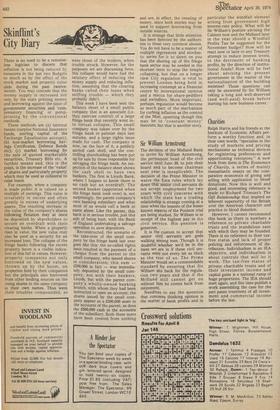Skinflint's City Diary
There is no need to be a remorseless logician to discern that inflation is not being reduced by measures in the last two Budgets so much as by the effect of the stock market and property value slide during the past twelvemonth. You may concede that the money supply is increased not only by the state printing money and borrowing against the issue of government securities and 'compensatory financing' or pumppriming by the conventional methods.
These methods are (a) internal means (surplus National Insurance funds, sterling capital of the Exchange Equalisation account); (b) non-market borrowing Savings Certificates, Defence Bonds etc); (c) market borrowing by the sale of quoted marketable securities, Treasury Bills etc. A further means and, this is the point, is the increase of the 'value' of shares and particularly property which may be used as collateral to raise loans.
For example, when a company is made public it is valued on a multiple of earnings. This value is invariably in excess and often greatly in excess of underlying assets. The resulting increase in the value of the company's shares following flotation may at once be deposited by shareholders to secure an overdraft with their clearing banks. When a property rises in value, the new value may also be used as a security for an increased loan. The collapse of the fringe banks following the recent property boom is a visible indication of this fall in values. However, property companies not only borrowed on the new values, thrown up by the boom, on properties held by their companies but the principals also borrowed from other lending sources on the rising shares in the same company in their own names. Thus were their troubles compounded, as were those of the lenders, when trouble struck. However, for the purposes we are discussing here, this collapse would have had the salutary effect of reducing the money supply and reducing inflation, assuming that the clearing banks called their loans when sniffing trouble — which they probably didn't.
This week I have been sent the balance sheet of a small public
company that is an associate (i.e.
they exercise control) of a large fringe bank that recently went in to virtual collapse. This small company was taken over by the fringe bank in palmier days last autumn, and a large rights issue made for cash. The company is now, on the face of it, a publicly quoted cash shell, and the con trolling shareholding has been put up for sale by those responsible for salvaging the fringe bank. An ins pection of the balance sheet shows the cash shell to have two bankers. The first is Lloyds Bank, where I happen to know there is no cash but an overdraft. The second banker (appointed when the fringe bank took over) is, not surprisingly, the parent company's own banking subsidiary and what most of us would call a bank in name alone. Like the parent, this bank is in serious trouble, just this side of being bust, with the Bank of England undertaking a salvage operation to save depositors. Reconstructed, the scenario of the take-over of the small com pany by the fringe bank last year goes like this: the so-called rights issue resulted in the payment of a cheque from the parent to the small company, who issued shares in consideration; this sum — £500,000 in fact — was immedia tely deposited by the small com pany, not with their bankers, Lloyds, but with the parent com
pany's wholly-owned banking branch, with whom they had been instructed to open an account; the shares issued by the small company appear as a £500,000 asset in the accounts of the parent, as does the £500,000 cash in the accounts of the subsidiary. Both these sums have been created from nothing
and are, in effect, the creating of money, since both entries may be used to support borrowing from outside sources.
It is strange that little attention has been directed by the authorities to these very common abuses. You do not have to be a master of multiple regressions and stochastic series for it to dawn on you that the shoring up of the fringe bank sector may be needed in the shortest term to stop the temple collapsing, but that on a longer view City regulation is vital to prevent London being held in increasing contempt as a financial centre by international opinion and a mecca for share-peddlers and swindlers. More important, perhaps, regulation would become as much part of the mechanism for curbing inflation as the control of the Mint, upsetting though this may be to 'constant money' theorists, but that is another story. particular the windfall element arising from government high interest-rate policy. What will be Sir William's posture advising the Cabinet now and the Midland later in the year should a Windfall Profits Tax be suggested for the November budget? How will he react now or later to any Treasury attempt to reduce interest levels, to the detriment of banking profits, by the direction of institutional funds? How will he feel about advising the present government in the matter of the nationalisation of the building societies? These questions can only be answered by Sir William taking a long and well-deserved (and well-paid) break before starting his new business career.


































 Previous page
Previous page